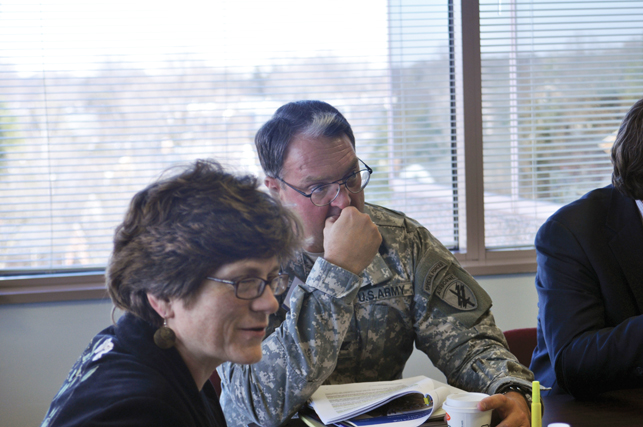ELECTIONS:
A Framework to Deter Electoral Violence in Unstable SituationsMarch 12, 2010

Election workshop attendees, Dorothy Taft, Director of USAID’s Office of Democracy and Governance, and William Lafontaine from the U.S. Department of Defense.
Despite an arctic cold day, over 35 experts gathered at Creative Associates on January 7 to examine a draft Technical Guidance Handbook on Electoral Security. Although elections seek to advance the peaceful determination of governance and transfer of political power, addressing the persistence of electoral conflict and violence has emerged as a priority for USAID and other donors.
Broad participation in the workshop drew from the United States Agency for International Development, the Department of Defense, the Department of Justice, the United Nations, the Helsinki Commission, academic institutions such as Princeton, American and George Mason Universities, non-governmental organizations such as the United States Institute of Peace and International Foundation for Electoral Systems (IFES), and private security firms such as GardaWorld and Pax Mondial. This timely and constructive review provided comments and guidance to USAID and Creative on the development of this Handbook and an accompanying Electoral Security Assessment Framework.
“Creative’s electoral team set an example by inviting serious review and discussion by government and private experts,” Creative’s President & CEO Charito Kruvant commented. The Handbook is to serve as a complementary guide to USAID’s Democracy and Governance Assessment Framework and its Conflict Management and Mitigation Assessment Framework.
“While popular self-determination through the ballot remains a universal principle of governance, the persistence of electoral violence threatens to compromise this universality by usurping its premises of constructive political competition. In devising this Handbook and Assessment Framework, USAID and Creative seek to counter these threats to assure that elections remain peaceful instruments for parties to achieve governance,” said Handbook author Jeff Fischer.
Still a work in progress, the Handbook is intended to assist USAID officers in developing elections programming throughout the world. While 57 percent of the world’s population lives under democratic governance, many nations continue to struggle to establish democratic processes in their countries. Western donors have long made a priority of allocating resources to ensure that fair and transparent elections proceed with minimal irregularities in post-conflict countries.
“The purpose of the Handbook is to provide USAID Democracy and Governance Officers, policy-makers and practitioners with strategies and methodologies to guide the development of policy and programming for electoral security,” Fischer said. “This strategic approach intends to develop electoral security systems that are sustainable and can be assisted by USAID programming initiatives.”
Given these goals, the Handbook is no small undertaking and could influence electoral programming for some time to come. The Handbook provides a methodology for USAID Democracy and Governance officers to identify potential targets of violence and establish likely perpetrators and their motives. The “electoral cycle” approach developed by the European Union and the United Nations Development Program is employed to identify points in the pre-election, Election Day or post-election phases when violence could occur. As threats may also vary by region, municipality or neighborhood, potential locations for violence also need to be mapped. Finally, the level of intensity of the potential violence is explored in order to determine what tactics will be employed by perpetrators to achieve their ends. By capturing such an understanding of the violence, Democracy and Governance officers can develop program responses to prevent, manage or mediate these threats.
While the expert comments are being incorporated into the draft, the Handbook is being further informed by field research into conflictive election environments undertaken by Fischer in Bangladesh, Zimbabwe and Colombia. Once the Handbook and Framework are completed, the content will be developed into a curriculum for a training of trainers program for USAID Democracy and Governance Officers.
